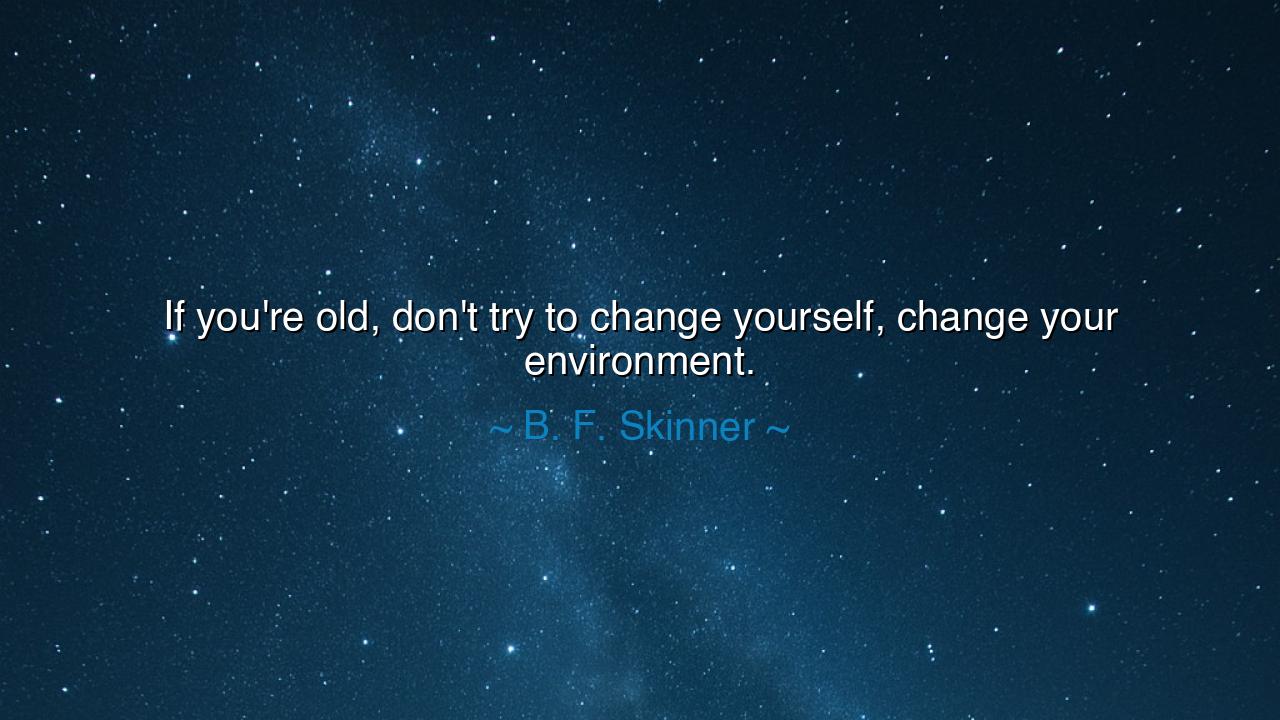
If you're old, don't try to change yourself, change your






"If you're old, don't try to change yourself, change your environment." These words of wisdom, spoken by the great B. F. Skinner, offer a profound insight into the nature of aging and adaptation. In our youth, we are often encouraged to change ourselves, to improve, to mold and reshape our personalities, our bodies, and our minds in pursuit of an ideal. But as we grow older, the idea of changing who we are becomes a much more daunting task. The challenge of aging is not to fight the inevitable passage of time or to attempt to become something we are not, but to shift the world around us in such a way that we can continue to thrive without the burden of self-reinvention.
In old age, the desire to change oneself can often lead to frustration, for the body grows frail, the mind may not be as sharp, and the limitations of time begin to reveal themselves in ways that are impossible to ignore. But Skinner’s insight reveals a powerful truth: self-change in old age may not be the most effective or realistic pursuit. Instead, changing our environment—the world around us—gives us the freedom to continue living in a way that respects the natural rhythms of life, allowing us to adapt without needing to force ourselves into a mold that no longer fits. It is the environment that we can control, not our own aging selves. In the battle with time, we do not fight against the physical world, but we reshape it to fit the person we are today.
Consider the elderly wise men and women of ancient cultures—those who have lived long lives and hold within them the wisdom of many generations. These individuals rarely sought to change themselves in the face of age, for their grace and maturity were born of a long process of self-acceptance. Instead, they understood that their environment could be molded to fit their evolving needs. A wise elder knows that instead of changing who they are, they can arrange their surroundings—whether it is through creating a peaceful space, seeking supportive communities, or adapting their lifestyle to better suit their body’s needs. Through this, they remain not only relevant, but active participants in the world around them.
The life of Socrates exemplifies this idea. Though his body aged and his physical abilities declined, his spirit and mind remained strong. Rather than changing who he was or the nature of his thoughts, he adapted his environment to continue his work as a philosopher. He spent his later years in conversation, not as an isolated thinker, but surrounded by those who sought to learn from him. His environment—his students, his community, and the very spaces in which he shared ideas—was what allowed him to continue contributing to the world. Socrates’ ability to create an environment conducive to his intellectual work allowed him to thrive despite the limitations of his aging body.
Similarly, Leonardo da Vinci, though deeply invested in physical creations and studies throughout his life, also understood the importance of creating an environment that suited his older years. As his body grew weaker, he began to focus more on the mental aspects of his art and inventions. He adapted his environment to suit his needs, cultivating a space for reflection and creation that allowed his genius to flourish even as his body faltered. Da Vinci's approach to aging was not to change himself, but to transform his surroundings, enabling him to continue creating and contributing in new ways.
Skinner’s quote offers us a lesson in adaptability. As we grow older, we cannot expect to continue forcing ourselves into the same molds that worked in our youth. Instead, we must recognize that true growth in old age comes not from attempting to defy the natural course of time, but by shifting the environment to suit our evolving needs. This shift may mean creating new habits, finding spaces where we feel comfortable and useful, and surrounding ourselves with people who bring out the best in us, despite the limitations that come with age. We are not meant to be reduced by age, but to find new ways to flourish, to contribute, and to live fully.
Thus, the lesson from Skinner’s words is that as we face the inevitable changes of age, we must look outward rather than inward. Change your environment, not your spirit. Adapt your life to continue living with purpose, dignity, and fulfillment. This does not mean avoiding the reality of aging, but it means embracing it in a way that allows us to thrive within the world we inhabit. Redesign your surroundings, seek out new possibilities, and remember that as long as we have control over the environment, we can remain vibrant at any stage in life.






AAdministratorAdministrator
Welcome, honored guests. Please leave a comment, we will respond soon